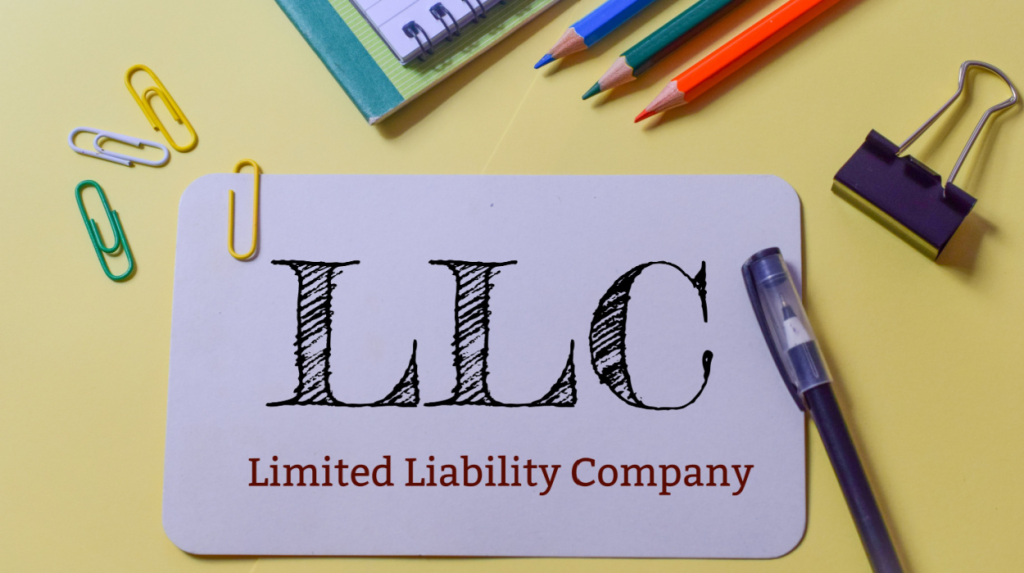Understanding the Formation Process for an LLC.
by Shethana Jul 08, 2024  17 MIN READ
17 MIN READ

An LLC, short for Limited Liability Company, is a type of business setup that takes some bits from both C corporations and general partnerships. It’s designed to give its owners, who are called members, protection so they aren’t personally on the hook for any debts or money the company owes. This means there’s a clear line between what belongs to them personally and what belongs to their business.
When it comes to taxes, the IRS sees an LLC more like a group of buddies rather than its own thing. Any money made or lost gets reported on the personal tax returns of whoever owns part of the LLC. This way of handling taxes helps avoid getting taxed twice – something many businesses worry about.
Depending on how many people own it, an LLC can be just one person running things or several partners in charge together.
In essence, choosing an LLC as your go-to when starting up means you get shielded from being directly responsible for debts while reaping benefits during tax time because profits only get taxed once. Plus, you have more say in how everything is run compared with other setups like corporations. Small businesses often go this route since it protects personal stuff while offering perks related to taxes and flexibility in managing day-to-day operations.
The Unique Benefits of Operating as an LLC
Operating as an LLC brings a bunch of cool perks compared to other ways you can set up your business. For starters, it gives the people who own the company what’s called limited liability protection. This is just a fancy way of saying that if things go south and the business owes money, the owners’ stuff like houses and cars won’t be on the line for paying off those debts.
With an LLC, there’s also some sweet tax benefits. The big one here is something called pass-through taxation. It means instead of taxing both the company and its owners on profits (which would be super annoying), any money made or lost gets reported only on each owner’s personal tax return. So, this could save them quite a bit when it comes time to pay taxes and makes dealing with taxes less of a headache.
On top of all that, running an LLC means you get more say in how everything is run without having too many rules forced upon you about who has to do what within your company. Through something known as an operating agreement, every owner can have their responsibilities spelled out so everyone knows who does what which helps avoid conflicts down the road.
In short: choosing to operate as an LLC could mean protecting your personal assets through limited liability protection while enjoying some nice tax breaks and being able to shape how your business runs thanks to flexible management options laid out in an operating agreement.
Common Misconceptions About LLCs
There are a couple of things people often get wrong about LLCs that we need to clear up. For starters, some think an LLC is just like being a sole proprietor. While it’s true they both give you limited liability protection, having an LLC also means you get perks like pass-through taxation and more ways to run your business.
Then there’s the mix-up between LLCs and corporations, whether C or S types. Sure, all three keep your personal assets safe from business debts but how they handle taxes and who can own part of the company really sets them apart. Corporations face different tax rules and have limits on ownership that don’t apply to LLCs.
Before picking the type of business structure for yourself, it’s crucial to weigh each option’s pros and cons carefully. Talking with a business attorney or someone who knows taxes well could help sort out any confusion and point you in the right direction based on what you need for your venture.
Preparing to Form Your LLC: What You Need to Know
Before starting your LLC, it’s important to remember a few crucial things. You need to know about the documents required for setting up, what a registered agent does, and what the secretary of state needs from you. With this knowledge and preparation, forming your LLC can go smoothly and successfully.
Essential Documents and Information Required
When you’re setting up an LLC, there are a few key pieces of paperwork and details you need to have. These include the articles of organization, the operating agreement, and an employer identification number (EIN).
With the articles of organization at its core, your LLC gets defined. This document spells out important stuff like what your business is called, where it’s located, and what it plans to do. It also gives owners protection from being personally on the hook for debts or lawsuits against the company by establishing limited liability protection. On top of that, it lays out how your LLC will be run.
Then there’s the operating agreement which plays a big role too. In this document, everything about how members interact with each other and make decisions is detailed – think who gets what share of profits or how votes count when making big choices for your business. Even though not every state says you must have one; getting an operating contract sorted can save lots of headaches later because everyone knows where they stand.
For dealing with taxes correctly as a business entity in Uncle Sam’s eyes; snagging an employer identification number (EIN) from Internal Revenue Service (IRS) becomes crucial too.
Deciding on the State of Formation: Factors to Consider
When you’re setting up an LLC, picking the right state to do it in is a big deal. Every state has its own set of rules for how to start and run an LLC. So, thinking about what each place demands is key.
Here are some things you might want to think about before choosing where your business will call home: What the laws in that state say, if you need a real office there, and what kind of paperwork like business licenses you’ll have to get sorted. States can also differ on how much they charge for filing fees or keeping your registration updated with annual reports. It’s smart to look into these costs ahead of time.
On top of this, where your LLC starts can affect where else it can operate. If your plan includes expanding across borders into other states down the line, remember that those places might ask you to register as a “foreign LLC.”
In short, deciding on which state should be home base for your LLC involves weighing several unique factors from one place against another’s specific requirements . Getting advice from someone who knows all about business law—a business attorney—can really help make sure you’ve thought everything through properly.
Understanding the Costs Involved in LLC Formation
When you’re thinking about setting up an LLC, it’s crucial to know all the costs that come with it. These expenses can change based on where you are and what your business needs, but there are a few usual ones to keep in mind.
At the top of the list is the filing fee. This is something states ask for when you hand in your articles of organization or other paperwork needed to get started. How much this will set you back depends on where your LLC will be based, so make sure to look into what your state requires.
Then there’s franchise taxes – not every state asks for these, but if yours does, they’re usually paid yearly. Unlike income taxes which depend on how much money you make, franchise tax might be calculated from how much your company is worth or its total sales.
Some folks decide it’s worth getting a registered agent service too. This means someone else takes care of any legal or tax mail for your business. It costs extra but can really help out if you’re swamped with work and want one less thing to worry about.
It makes sense to plan ahead for these expenses before diving into forming an LLC so nothing catches you off guard financially speaking.
Talking things over with a business attorney or someone who knows lots about taxes could also give insights specific requirements related specifically tailored advice regarding potential spending involved in starting up within particular regions/states.
The Step-by-Step Guide to Forming Your LLC
To set up an LLC, you need to take a few steps. It starts with picking out a name for your LLC and then moving on to fill in the required documents. Following these steps closely is crucial. Through this detailed guide, we’ll lead you through every part of the llc formation journey, making sure you’re equipped with everything necessary to get your business off the ground successfully.
Step 1: Choosing a Name for Your LLC
Picking out a name for your LLC is the first big step when you’re setting it up. Think of this name as how everyone will know your business, showing up on all the official papers and whenever you do any kind of business deal. When deciding on a name, make sure it stands out and follows what your state says is okay.
To start off with choosing a good name, doing a name search is key to see if anyone else has already taken that cool idea you have. This can usually be done online through the website of your state’s secretary of state. After making sure no one else has it, then you’re all set to move forward in getting your LLC going.
Remember though, most places want to make sure people can tell what type of company yours is right from its name by including “LLC” or “limited liability company.” It’s their way of saying hey, this isn’t just any business; it’s a specific type of business entity, so they insist that part gets added into whatever creative title you pick for yourself.
Step 2: Appointing a Registered Agent
When you’re setting up an LLC, picking a registered agent is key. This person or service gets all the legal and tax stuff for your business, like when someone sues you and they send over those official papers.
You’ve got two choices here: be your own registered agent or go with a professional service. If you decide to do it yourself, remember that you need to give out an address where these important papers can come in during work hours.
On the other hand, using a registered agent service makes things easier because they take care of all this paperwork for you. They make sure nothing misses your attention by keeping track of any legal issues or tax notices coming your way.
No matter which route you choose, having someone reliable to handle this kind of correspondence is super important for staying on top of things.
Step 3: Filing the Articles of Organization
When you’re setting up an LLC, one of the first things you have to do is file the articles of organization. Think of these as a big deal because they officially make your business a real thing in the eyes of the law. They tell everyone what your LLC’s name is, where it’s located, and what it plans to do.
To get this done, you need to send some paperwork over to the office of the secretary of state in your area. Most times, you can either do this through their website or by mailing it in; how exactly depends on where you live. Don’t forget that when you submit these documents, there’s also a filing fee that needs to be paid.
Inside those articles are all sorts for important bits about how your LLC works – like who gets to decide what and who owns which parts. Making sure everything on this document is right and makes sense is super crucial.
After everything with your articles has been checked off and given the thumbs up by state officials,your company becomes an official business entity.This means it’s recognized legally as its own “person” almost.
Step 4: Crafting Your LLC Operating Agreement
Making an LLC operating agreement is a crucial step when you’re setting up your business. Even though not every state says you must have one, it’s a legal paper that explains who owns the business and how it’s run. It talks about what each person in the company can do and has to do, along with how things like making decisions and sharing profits work.
In this document, you should make sure to talk about important stuff like how money gets split up, who decides what, and everyone’s job in the company. It’s also good for figuring out what happens if someone new wants to join or if someone wants to leave, plus solving any arguments that might come up.
By putting together an operating agreement, you get to decide exactly how your LLC works so it fits perfectly with what your business needs. This way everybody knows where they stand which helps stop fights before they start.
Even though having this document isn’t always required by law everywhere; getting one done is really smart for all LLCs. A well-made operating agreement sets a strong base for your business doing well.
Step 5: Obtaining an EIN and Opening a Business Bank Account
After you’ve picked out a business name and taken care of the paperwork with the state, it’s time to get an Employer Identification Number (EIN) from the Internal Revenue Service (IRS) and set up a bank account for your business. Think of an EIN as your LLC’s own Social Security number but for tax stuff. You’ll need this number not just to open a bank account for your company but also if you plan on hiring people or when it’s time to deal with federal taxes.
Getting an EIN is pretty straightforward. You can either fill out a form online at the IRS website or send in Form SS-4 through mail or fax without having to pay anything. They’ll ask you for some simple details about your LLC like its name, where it’s located, and what kind of business you’re running. Once they give you that EIN, opening up a bank account specifically for your business becomes possible.
Having this separate business bank account is key because it keeps money matters clear between what belongs personally to you and what belongs to the LLC. This clarity helps protect personal assets under limited liability protection—an important feature of forming an LLC—making sure only company assets are on the line if things go south financially speaking; plus, tracking how much money comes into and goes out of your biz gets way easier come tax season.
When setting up this special bank accounts, remember: bring along that new shiny Ein And whatever ID papers The Bank asks For Each place might have different rules so checking ahead saves headaches later Also picking A Place That Gets small businesses offering handy tools Like Online Banking Or Business Credit Cards Can Be A Smart Move
Step 6: Complying with State-Specific Requirements
To keep your LLC on the right side of things, it’s really important to follow what each state says you have to do. Every state has its own set of rules for starting and running an LLC. If you don’t stick to these rules, you could face fines, lose your protection from being personally sued over business stuff, or even see your LLC shut down.
For starters, with a lot of businesses depending on what they do and where they are located might need a special permit or license just to operate legally. This is one way states make sure businesses meet certain standards specific to their industry.
Then there’s the thing about having to send in an annual report for many places. States want this so they can have up-to-date info like who owns the business and where it’s at which helps them keep track of everything properly. Not sending this report can get pretty serious – think penalties or possibly saying goodbye to your LLC.
Staying sharp about what exactly your state asks from you and keeping up with any new changes is key here. Getting advice from someone who knows all about business law or working with a service that handles setting up companies can be super helpful in making sure you’re doing everything by the book.
Conclusion
Starting an LLC can be a smart choice for lots of businesses. It comes with special perks and protects your personal stuff from any business problems. Knowing what you need to do, like picking out a name and getting an EIN, is really important if you want to set up your LLC the right way. Making sure you’re doing everything according to state rules and keeping on top of things are crucial for keeping it going strong in the long run. Handling legal matters, sorting out disagreements, and being aware of new laws matter a lot too. Also, thinking ahead about how to grow through good marketing and finding money is key. By sticking to these steps and ideas, your LLC can do well even when facing tough times.
Frequently Asked Questions
Can I Form an LLC in a Different State from Where I Reside?
When you want to set up an LLC, it’s important to know that state law is in charge of the whole process. This means every state has its own set of rules for how to start and run an LLC. You can actually form your LLC in a different state from where you live, which is called a foreign LLC. But there are some things you need to keep in mind, like needing someone known as a registered agent who represents your company and having an official business address in the state where your LLC is formed. It’s really crucial to look into and follow all the specific requirements laid out by the state for foreign LLCs.
How Does an LLC Affect Personal Liability and Taxes?
When you set up an LLC, one of the big perks is that it keeps your personal stuff like your house and car safe if your business owes money or has other financial issues. This kind of safety net for what you own personally is known as liability protection. On top of this, there are some nice tax advantages too. With something called pass-through taxation, any money the company makes or loses goes straight onto your own tax return. This way, owners don’t get hit with taxes twice on their business profits – once when the company earns it and again when they take it out as income.
What Are the Annual Maintenance Requirements for an LLC?
Every year, LLCs need to do some upkeep tasks that differ from one state to another. Among these tasks is the need to submit an annual report so the LLC stays on good terms with state law. This report usually covers simple details about the company like where it’s located, how to get in touch, and who owns or runs it. If a business doesn’t keep up with these requirements, it could end up in hot water with the state. This might mean losing its status as being in good standing and possibly facing fines or even having to shut down completely. On top of this, there are states that ask for franchise taxes from LLCs too.
About Arnifi
Arnifi is digital first Corporate service provider helping companies enter the Middle East region, starting with UAE and Saudi Arabia markets. Founded and backed by professionals from Amazon, Souq and other large companies operating in KSA – the team understands what it takes to succeed as a startup in both UAE and Saudi Arabian markets, apart from going through the setup process multiple times. Arnifi will provide a truly digital experience to entry and scale up of companies both UAE and Saudi Arabia. Discover tailored solutions and strategic partnerships that propel your business forward. Check out at – www.Arnifi.com for more details.
Top UAE Packages

Related Articles
Top UAE Packages



